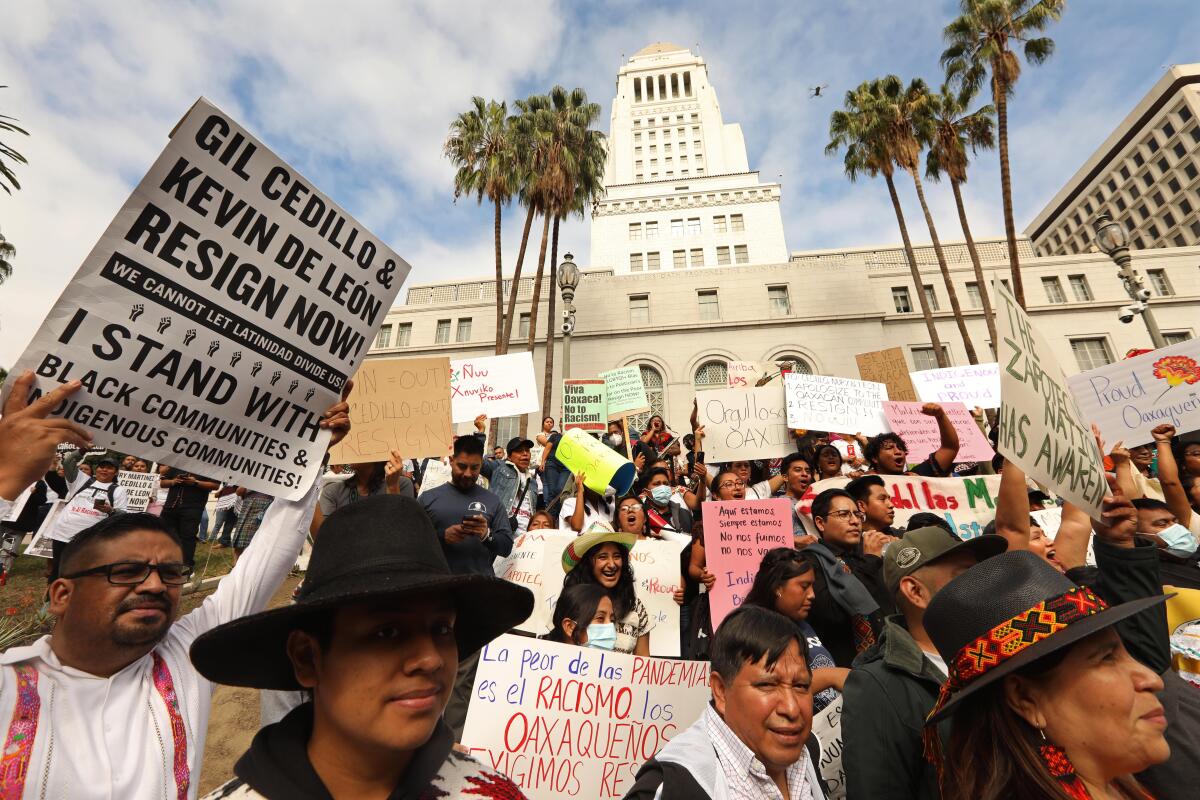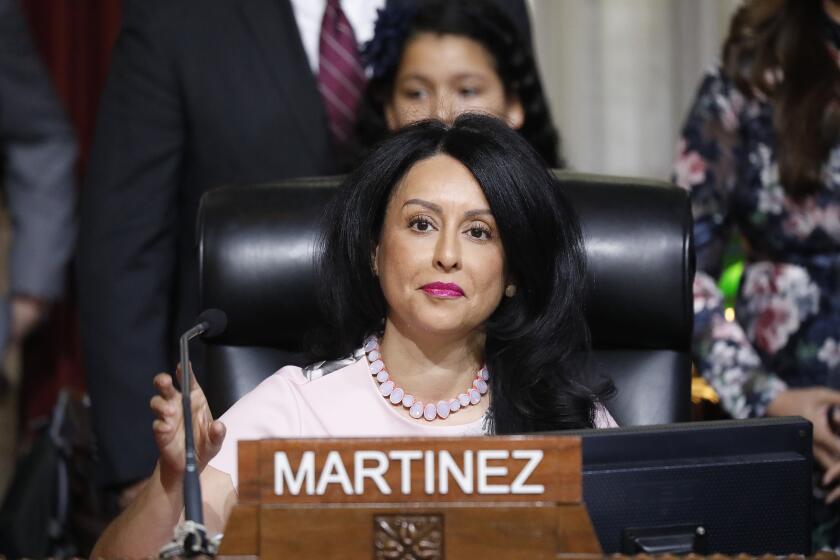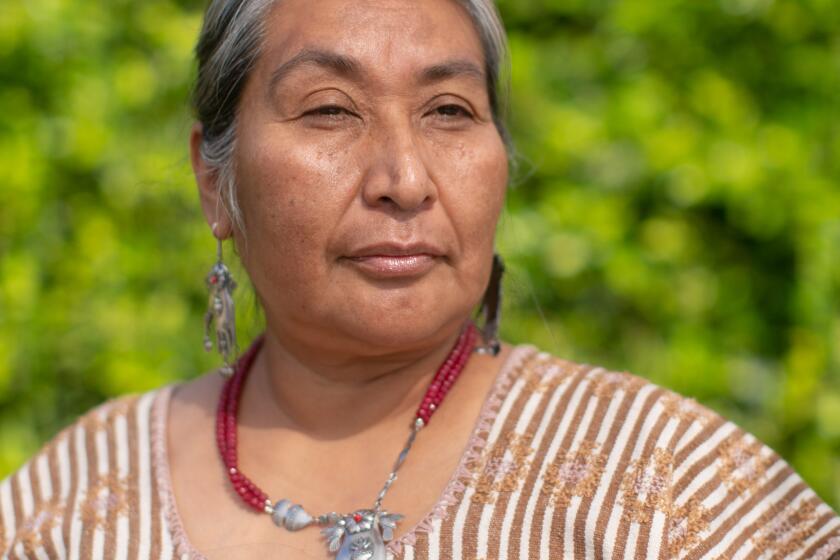Following City Council members’ racist remarks, hundreds of Oaxacans march for justice in L.A.

As hundreds of protesters marched through downtown Los Angeles to City Hall on Saturday afternoon, they made sure everyone knew they were Oaxacan and proud.
Their signs boasted pueblos like San Bartolomé Zoogocho, Santa María Xochixtepec and Santiago Zoochila. Brass bands played ‘sones’ and ‘jarabes,’ representing the music tied to their identity. Their chants rang out through the streets: “Se ve, se siente, Oaxaca está presente.” “You see it, you feel it, Oaxaca is present.”
Among those in the crowd was Blanca Ruiz, 23, who referred to herself as a “Koreatown Chaparrita,” a nod to her neighborhood and short stature.
Ruiz’s family is from Oaxaca and the young woman works with Oaxacan youth.
“Any hurtful words, this cures it,” Ruiz said, as she looked around at her fellow Oaxaqueños. “This heals my heart.”
The hurtful words she was referring to came from a leaked audio recording in which some City Council members disparaged Black and Indigenous people, among others, in starkly racist terms.
A leaked audio recording of members of the L.A. City Council, including Council President Nury Martinez has rocked L.A. politics months before a key election.
In the audio recording of a conversation that took place in October 2021, former L.A. City Council President Nury Martinez refers to Oaxacans as “little short dark people” — a racist stereotype often used to demean Indigenous communities.
“I don’t know what village they came [from], how they got here, but boy they’re ugly,” Martinez said. She added, “Tan feos” — so ugly.
Martinez is heard making the racist remarks while talking with fellow Councilmembers Kevin de León and Gil Cedillo and labor leader Ron Herrera about how the city’s council district boundaries should be redrawn.
Martinez resigned this week, in the wake of the scandal, but Indigenous community leaders say it’s not enough. They are calling for the resignations of Cedillo and De León and a public apology from Martinez.
Los Angeles is home to one of the largest Oaxacan communities outside of Mexico. One expert estimated that there are as many as 200,000 Zapotecs — the largest Indigenous group from Oaxaca — living in Los Angeles County. As early as the 1940s, Oaxacan immigrants came to the U.S. in search of better wages and jobs, working in agriculture through an established bracero program of seasonal migrant workers. Oaxaca is one of Mexico’s poorest states, but the people have deeply influenced U.S. culture and food and shaped Los Angeles over the years.
Comunidades Indígenas en Liderazgo, or Indigenous Communities in Leadership, and prominent leaders from Indigenous communities across California gathered Saturday to demonstrate and demand resignations.
Odilia Romero, director and co-founder of CIELO, said people came from all over the state, “from farmworkers to construction workers, because Indigenous people are essential to the economy of this city, of this state and of this country.”
A leaked recording of L.A. City Council members and a labor official includes racist remarks. Council President Nury Martinez apologizes; Councilmember Kevin de León expresses regret.
She said it’s important for those officials involved to step down.
“They cannot continue representing the highest population of Indigenous people’s district, when you think and talk about them in such a despicable way,” Romero said.
Hundreds of people, spanning all racial and ethnic groups, joined them at Trade Tech College to march the three miles to City Hall.
Among those in the crowd was Erika Aquino, 37, who came with her four children and her mother, an immigrant from Hidalgo Yalalag, a village in Oaxaca.
“In Mexican culture there’s always been colorism,” Aquino said. “Myself, as a brown person, I have always felt and seen how our own kind sometimes favor someone of lighter skin. It’s always been an issue and I think more hurtful when it comes from someone you know is your own.”
Aquino’s mother, Emma Diego, 63, said she came because she was angry.
“We voted, as Democrats, to put people into office who will guide us, who will be our leaders. That’s how I saw Cedillo,” she said. “But we were wrong. He said Indigenous people and immigrants mattered to him. He voiced that, but his heart didn’t believe it.”
“I came here so they can resign. We — Democrats, Latinos — put them in … just like we put them in, we can force them out.”
‘I thought we had made great progress in the last three years in gaining recognition,’ said one Oaxacan, who criticized remarks by Nury Martinez.
As she marched, Lizbeth Bautista, 34, carried a sign that read “Proudly Indigenous” in Zapotec, Chontal, Mixtec, English and Spanish.
Bautista’s maternal grandfather came to California through the bracero program. He went back and forth between the U.S. and their town of Santiago Laxopa in Oaxaca. Bautista was born in the Oaxacan town, but moved to California when she was 3 years old.
When she heard the recording, she flashed back to what she heard growing up. As a child attending school in the U.S., she recalls fellow Mexicans derogatorily referring to her as a “Oaxaquita,” or Little Oaxacan.
“We’ve always been made to feel that way by our own paisanos, Mexicans,” the Pico-Union resident said. “There’s a lot of colorism and a lot of issues within our community that need to be addressed. I see this as an opportunity.”
She added: “I think we need to acknowledge our Black brothers and sisters that fought so hard to get the civil liberties that we enjoy as minority groups, as Oaxaqueños. Every single minority in this country is enjoying the liberties we enjoy because of their work.”
There were references to the leaked tape on signs scattered throughout the crowd. One woman held a sign that read, “Los racistas ‘tan feos.’” The racists “so ugly.” And another that read, “We’re short, dark, but beautiful.”
Others simply wrote “You must resign.” Another sign said “Fuera Racistas” with an x through the photos of Cedillo and De León.
Evelyn Mireles, 34, said she came out because she’s first generation American and “I’ve seen how much my parents have worked and dedicated their lives to the American dream.”
She said Martinez offended not only her parents, who are from Oaxaca, but also her son who is a year old.
Mireles said she was not surprised to see the turnout Saturday.
“It validates how proud we are as Oaxaqueños,” she said. “That we’re here.”
Once they reached City Hall, the crowd shouted, “Fuera!” when Cedillo and De León’s names were said. “Out!”
More to Read
Sign up for Essential California
The most important California stories and recommendations in your inbox every morning.
You may occasionally receive promotional content from the Los Angeles Times.













